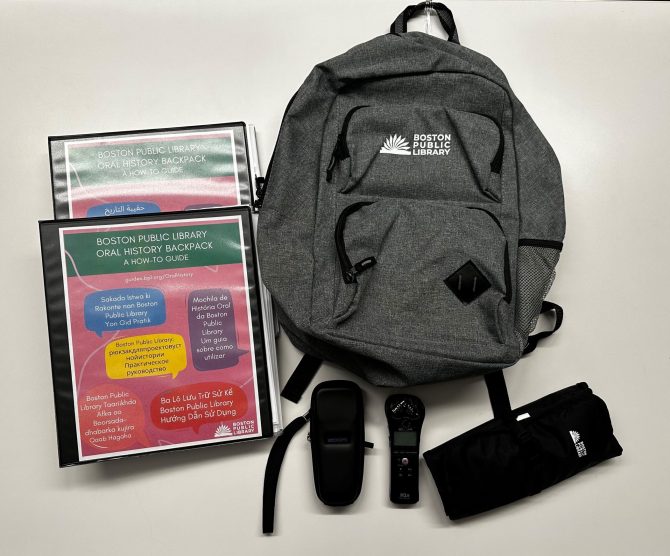This is a guest blog post by Sydney Villegas, Oral History Intern at the Boston Public Library.
As Boston residents, history surrounds us. With the Boston Public Library’s new Oral History Backpacks, you can build and record your own oral history projects. Whether you choose to preserve family stories or document how your neighborhood has changed over time (as just a few examples), these backpacks contain tools and guidance to create a project from scratch.
What is Oral History?
Oral history is a historical research method that uses recorded interviews and sounds. It centers past and present personal experiences and can be a tool for members of historically underrepresented communities to add their perspectives to the historical record. We built these kits with the aim of supporting BPL community members in telling and preserving their stories.
The History Behind Oral History
Oral history is likely as old as storytelling and language themselves. Many cultures have used oral history to share knowledge before audio recording. For example, Indigenous communities, such as the Massachusett tribe, use oral history to pass down lessons, world views, and ancestral knowledge. Oral history became increasingly centered around technology with the invention of portable recorders in the 1930s. It later gained a larger following in colleges during the 1960s. Feminists, working class and LGBTQ+ activists, racial minorities, and other historically marginalized communities have also embraced oral history as a way of recording stories that were long neglected by academic and cultural institutions. With recording technology becoming more widespread, oral history is more accessible today than ever before!
Why Oral History Backpacks?
The oral history backpacks are designed to remove some barriers faced by new oral historians. Recording technology can be expensive and overly complicated with a seemingly endless number of buttons and switches. Some of us might feel daunted by the prospect of interviewing, even if the person on the other end of the recorder is a close family member (and sometimes, especially if). With solo-run projects, it can be difficult to find technical support or advice if you run into any problems. With these challenges in mind, we created the Oral History Backpack to help make oral history easier and eliminate the barriers that may prevent someone from starting a project. Patrons can borrow high-quality audio recording equipment that comes with an easy-to-read guidebook to oral history. If you run into any roadblocks with your project, you can email communityhistory@bpl.org for support with troubleshooting technology and finding resources. With the Oral History Backpacks, everyone and anyone can be an oral historian.
What Can I Do with an Oral History Backpack?
The Oral History Backpacks include:
- A portable audio recorder
- Basic tech accessories
- A resource binder with instructions and guidance for doing oral history, translated into 10 languages
- A backpack for taking your projects on the go
Oral history is flexible, and you can be creative with your project ideas. For inspiration on what your oral history project could look like, check out these projects:
- The Harriet Tubman House Memory Project
- Jukebox
- First Days Project
- Densho
- Country Queers
- Texas After Violence
While oral history is a method of research, it can also be a joyful and meaningful way to connect with your community. The planning process and bonding with your narrators through interviews are as valuable as the outcome of your project. So long as you have an idea and an interest, you can do oral history.
All teen and adult BPL patrons with BPL library cards in good standing can borrow Oral History Backpacks for up to 21 days. Kits are picked up at the Borrower Services desk at participating BPL branches. Check the catalog record to learn more about the oral history backpacks and their availability at participating branches. For more information about oral history and the backpacks please visit our Getting Started with Oral History Research Guide.
Finally, we’d like to thank our colleagues at Princeton University Library, Georgia Public Library Service, Door County Library, and Kentucky Historical Society for helping us create these kits by sharing their experiences and best practices with us. The BPL Oral History Backpacks came together thanks to your guidance!
Sources:
Historical information adapted from "Introduction: The Evolution of Oral History" The Oxford Handbook of Oral History, edited by Donald A. Ritchie, 2012



Add a comment to: Tell Your Story: Borrow Oral History Backpacks at the BPL